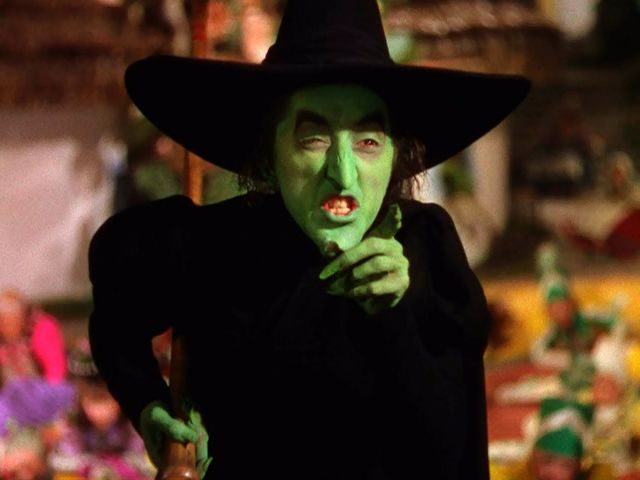From organizing mass hexes to setting up witch-themed Etsy stores, the feminist movement and witchcraft are becoming increasingly entwined.
In an article this week, feminist and author Laurie Penny documented the “boom in online occultism” and why feminists are so attracted to witchcraft.
“Days after Donald Trump won the U.S. election, videos of women ‘hexing’ Trump went viral around the world, encouraging budding magical practitioners to burn images of the president-elect to bring his works to ruin,” reported Penny on Wednesday. “Meanwhile, an entire explosive industry of witch-paraphernalia is boiling out of the cauldron of digital consumer culture.”
“You can buy your crocheted bat-bunting and your broomstick-decals on Etsy, while a couple of clicks away anonymous web artisans peddle laptop stickers declaring the owner, with more or less accuracy, a daughter of the witches they weren’t able to burn,” she explained. “Commodification is usually a poisoned apple for movements like this, but there’s a proud legacy of repurposing the witch-aesthetic for radical ends.”
The two scenes have become so intertwined that the term “witch” has even started to become synonymous with “feminist,” as online stores such as Witchsy sell feminist witch-themed goods.
http://blkprimadonna.tumblr.com/post/164304730677/ig-psychara#notes?ref_url=https://www.theverge.com/2017/12/12/16766260/witchblr-tumblr-trends-2017-witchcraft-crystals-fan-tarot#_=_
Dozens of witch-related products, ranging from pentagram-decorated clothing to “I’m a witch, you’re a bitch” pins, can be found on Witchsy among more typical feminist merchandise, while searching “feminist witch” on Etsy returns over 750 results.
Though a large percentage of “feminist witches” undoubtedly limit themselves to the aesthetic alone, an increase in political mass hexes shows a portion of the movement delves deeper.
Following President Trump’s inauguration, witches, covens, and even A-list celebrities started to hex the president with frequent “spells.”
In July, Lana Del Rey admitted to casting a spell on President Trump, and in October, Vox reported that thousands of members of the “resistance witches” had been casting spells against the president each month.
“On a typical Wednesday, by the light of the waning moon, Kate Doucette joined several thousand strangers on the internet in casting a spell to ‘bind’ Donald Trump,” Vox declared. “Doucette — which is her married name, not her legal name — is one of the ‘resistance witches,’ an at least 13,000-strong umbrella group of internet neo-pagans, Wiccans, solo practitioners who self-identify as ‘hedge witches,’ longtime magical practitioners in various traditions, and committed activists.”
“They’ve come together each month since Trump’s inauguration with one goal: to perform a spell — equal parts quasi-religious ritual and activist performance — to ‘bind’ the president, forming a collective known as the #MagicResistance,” they explained.
So what’s binding feminism and witchcraft?
According to Laurie Penny, “A general sense of powerlessness in a chaotic and competitive society, along with a revived interest in forms of feminism that don’t care who they frighten, may explain the growing appeal of hedge magic as a cultural aesthetic as much as a practice.”
The craze for witchery displays an encouragingly wide understanding that for social change to happen someone has to feel threatened. The paraphernalia of skulls and guts and ravens are merely a uniform that declares intent. I am not a nice, compliant creature, not a princess in training. I am something else. Something darker. There are more like me. Best beware.
Pissing off your overpious relations is as good an excuse as any to dabble in magic—and a good many modern practitioners are spiritual refugees of one sort or another from patriarchal, monotheistic religions as practiced in, for example, large parts of the United States. I’m convinced that part of the reason I first started getting interested in tarot and cartoon spellcraft at a tender age was to annoy my grandmother, who would have made a formidable witch herself had she not got married too young, as so many of her generation did, to some layabout called Jesus Christ who left her to raise six kids with nothing but the promise of salvation.
The feminist witches also see those women persecuted during the 17th century Salem witch trials as their late comrades — tortured and murdered by the patriarchy.
Still, the increase in feminist witchcraft hasn’t led to entirely receptive reactions from others in the witch community.
“The ‘witchblr’ community appropriates non-white cultures (Native American, Yoruba, Hindu, Caribbean, Romani, and so on) and comes up with a lot of shitty excuses for that,” complained one witch to the Verge, who wrote an article about “how witches took over Tumblr in 2017.”
And the community hasn’t been without its controversies; most notably 2015’s “Boneghazi,” where witches fought over the ethics of grave-robbing.
But the trend doesn’t appear to be declining anytime soon, with one follower of the late Anton LaVey’s Church of Satan claiming “the Trump era is an era of an occult renaissance.”
“Occultism keeps becoming more socially relevant in times of economic hardships and political strife,” the user proclaimed.
On the other hand, maybe witchcraft is just an excuse for feminists to pretend to be Hogwarts students from their beloved Harry Potter series.
Charlie Nash is a reporter for Breitbart Tech. You can follow him on Twitter @MrNashington and Gab @Nash, or like his page at Facebook.

COMMENTS
Please let us know if you're having issues with commenting.